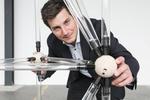Other

“Scientists at EPFL have developed a game-changing perovskite material that can be used as a cheaper and highly efficient alternative to gamma-ray detectors. Perovskites are materials made up of organic compounds bound to a metal. Propelled into the forefront of …

“Fiber optic sensors – used in critical applications like detecting fires in tunnels, pinpointing leaks in pipelines and predicting landslides – are about to get even faster and more accurate. EPFL engineers have developed an advanced encoding and decoding system that allows …

“Skin and cartilage are both strong and flexible – properties that are hard to replicate in artificial materials. But a new fabrication process, developed by scientists at EPFL, brings lifelike synthetic polymers a step closer. Natural materials like skin, cartilage and …

“Using a unique material, EPFL scientists have been able to design and study an unusual state of matter, the Quantum Spin Liquid. The work has significant implications for future technologies, from quantum computing to superconductivity and spintronics. In 1973, physicist …

“Algorithms developed at EPFL can help architects to design building structures that incorporate both new and reused components, thereby lowering their environmental impact. The construction industry is among the world’s most polluting sectors: in developed countries it accounts for …

“EPFL engineers have developed a computer chip that combines two functions – logic operations and data storage – into a single architecture, paving the way to more efficient devices. Their technology is particularly promising for applications relying on artificial intelligence. It’s …

“EPFL chemical engineers have developed a new way to manufacture zeolitic membranes, state-of-the-art materials used for gas separation in harsh conditions. Zeolites are porous minerals that occur both naturally but also are being synthesized artificially. Because they are stable and …

“Publishing in Science, researchers at EPFL have successfully overcome a limiting problem with stabilizing the best-performing formulation of metal-halide perovskite films, a key player in a range of applications, including solar cells. Perovskites are a class of materials made up …

“EPFL physicists propose a new path to detect infrared radiation with outstanding sensitivity, allowing detection of signals as low as that of a single quantum of light. When using our webcam or cell phone camera, we experience the tremendous capabilities …

“Researchers from EPFL’s Photonics Systems Lab have come up with a way of reconfiguring microwave photonic filters without the need for an external device. This paves the way for more compact, environmentally friendly filters that will be more practical …
